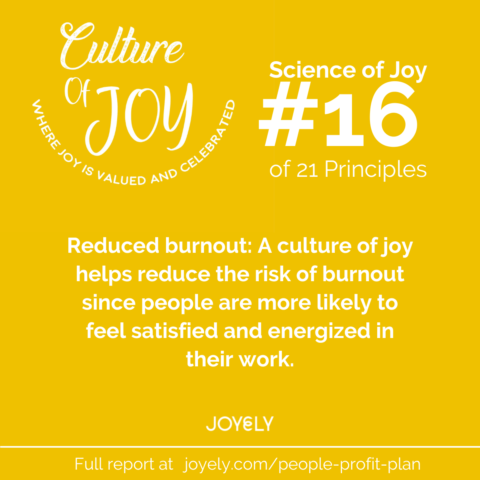Firstly, research shows that a culture of joy can increase employee engagement, job satisfaction, and creativity, which can lead to improved performance and productivity. In turn, this can reduce the risk of burnout and its associated costs, such as employee attrition, absenteeism, and decreased performance.
In addition, neuroscience has suggested that positive emotions, such as joy, can help to reduce stress levels, which is essential for reducing the risk of burnout (5). Studies have shown that laughter can reduce cortisol levels, a hormone associated with stress, by up to 39% (Cassoobhoy, 2020).


Several studies have also shown that a culture of joy can have a significant impact on brain functioning and neurochemistry. For example, research has demonstrated that positive emotions and activities, such as laughter and joy, can increase dopamine production and neuroplasticity in the brain, leading to better cognitive functioning (Segerstrom, 2003). Increased neuroplasticity can also help employees build resilience, which is key to preventing burnout.
What we do at JOYELY in our corporate programs offers products and services that promote joy in the workplace. The Culture of Joy programs offer team-building activities, wellness programs, and training sessions on work-life integration. We make sure all interactions are engaging, interactive, fun, and relatable, as well as easy and simple to understand.
JOYELY’s Chair of Joy Experience and specialized joy-enhancing techniques help increase productivity and build upon profitability strategies while decreasing turnover. We do all this while creating a healthier and more successful business.
Each company we work with is unique! At JOYELY, we consider the needs and values of each corporation we decide to work with. For example, we pay particular attention to the company mission and make sure there is an alignment of our approach and joy with the company’s mission or values.
Overall, we clearly communicate with corporations the extreme value of joy and the powerful science that backs a Culture of Joy. Our own unique research is outlined in the article, 21 Science-Based Reasons Why a Culture of JOY Is the Most Important Decision Your Company Can Make in 2023 will begin to create great results quickly.
We offer a 1–2-hour complimentary COJ Experience to select companies as an example of the Year of Joy Corporate Program.
Simply reach out to our JOYELY Team at www.joyely.com or you are welcome to connect with our founder, Sheryl Lynn at 949-303-5219 or sheryl@joyely.com
It’s time to immerse ourselves completely in the conversation of joy, to prioritize it above most things.. There’s no time to wait; it’s a matter of life and death.
Your Answer Matters!


We invite you to share your valuable experience. Your feedback not only guides future guests but also illuminates our path towards excellence. Please take a moment to leave a review and help shape our journey forward.



Welcome to JOYELY, where JOYELY Ever After is not just a dream, it’s our lifestyle.
© 2024 JOYELY. All Rights Reserved.